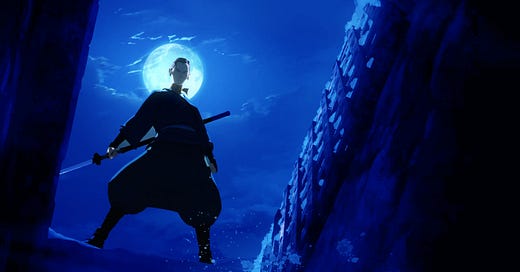‘Blue Eye Samurai’ and The Power of Culture, Identity, and Personal Storytelling
Another showcase of what adult animation can do in the right hands
I can only imagine the thundering echoes of praise that blew through the internet like a tornado when Netflix's Blue Eye Samurai came out last November. I’ve (almost) entirely missed it. In a way, it’s good that I did because I got to watch it after this year’s thematically similar (and also mega-successful) banger that Shogun became a few months ago. The two share so much culture, identity, and blood that they can easily overwhelm someone unfamiliar with Japanese history, watching them back to back. Even their flaws (yes, they both have a few) seem to stem from the same well: over-committing to too many characters and subplots and being unable to give each of them the apt climax they deserve.
But I’m getting ahead of myself. My point is: BES came first, and despite (or because of) seeing it after Shogun, I found it slightly superior to the AMC series. It’s a mesmerizingly beautiful, touching, and complex tale wrapped in revenge, class, and power.
It has to be said at this point: adult animation is the genre where nothing is off the table. Whether addressing taboos, showing bone-breaking and flesh-tearing violence, or exploring a path that just couldn’t be possible in live-action, animation is the perfect ground to do so. And BES earns a place in the pantheon of epic animated shows like Primal, Invincible, Scavengers Reign, and others by being unapologetically bold and true to its roots without holding anything back.
Mizu (Maya Erskine) is a bastard. The daughter of a White man and a Japanese prostitute — cursed with a pair of spellbinding ocean eyes —whose entire existence is defined by hate for being an outcast, a monster, an impure less than human. So it's no surprise she’s sworn to revenge as a child, determined to find and kill the four White men who could possibly be her father in Japan's Edo period. This is a quite standard revenge plot, but creators (and married couple) Amber Noizumi and Michael Green expand upon it by filling it with flesh-and-blood, deeply human characters and tragic backstories that ooze ambition and blistering emotions.
But there's another aspect the simplicity of this premise grants: a very detailed and sensitive portrayal packed with authenticity and tradition. I was especially impressed by how dominant of a role sexuality plays throughout these eight episodes, used not just for effect but genuine character building and moving the story forward. It's simply refreshing to see that TV shows can still do that to a great extent in a cultural climate where sensual scenes have become something to protest against (the increasing frigidity of today's younger viewers is truly troubling). There isn’t just space for it in BES, but it’s an integral part of the narrative as the main female characters fight back against the power and dominance that ruling men have over them.
Noizumi and Green knew what they wanted from the beginning and grasped the opportunity for elaborate and precise cultural representation as well as tackling social issues that are still as relevant today as they were hundreds of years ago. It’s no secret that Noizumi drew inspiration from personal experience as a half-Japanese and half-White woman, giving Mizu a constant battle with her identity that’s essentially the building block of the character and the emotional core of the series — which comes across beautifully and poignantly. It’s this deep, personal investment and accessible relatability (to anyone who knows the struggle of being an outcast for whatever reason) that lifts up the show as one of the best in recent years.
Of course, it needs to be said that all this is presented through top-notch visuals in an animation style that strikes the eye both with gorgeous, lived-in landscapes and gory fight scenes where torn limbs and crimson blood become poetry. And with that potent combination, Blue Eye Samurai is undoubtedly a feast for the eyes and the soul. It’s a gift that we’ll see more of it in the coming years.
Blue Eye Samurai is streaming on Netflix.
The reason for the lack of content in the last 3-4 weeks is that I’ve been on a much-needed holiday, watching less TV and films than usual, but I’m back now so there’s more to come. Also, if you haven’t read my review of Presumed Innocent, which is currently airing on Apple TV+, I urge you to check it out and tune in because it’s a lot of “guilty” fun.
As always, thanks for reading, and please share the newsletter with someone who might be into it, too. It always helps.






